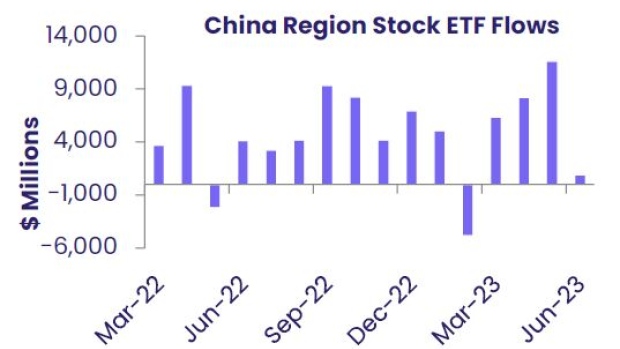Jun 9, 2023
This Week in China: Beijing Wants a Slow Bull Market in Stocks
, Bloomberg News

(Bloomberg) -- China’s Communist Party, which has long sought to cultivate a ‘slow’ bull market in equities, is once again attempting to drive the nation’s ardent savers into languishing stocks.
Influential state media ran commentaries this week urging investors to take a long-term view on domestic stocks. People should have more “confidence, determination and patience” as a considerable amount of funds could flow into the market, said the Economic Daily. Investors should stick with value, urged Financial News, which is backed by the People’s Bank of China.
Authorities are also chiming in. China will encourage funds to increase their equity allocations, Yi Huiman, the top securities regulator, said at a forum in Shanghai. Fund vendors and asset managers were told to stop displaying real-time estimates of mutual funds’ net value by mid-June, a move intended to reduce speculative day-trading. (Penalties for switching funds are either small or non-existent in China).
Engineering gains in China’s momentum-driven stock market has always been a challenge for Beijing, which will be cautious about creating another boom-bust cycle. Talking up stocks can be a dangerous game when capital controls limit investment choices: in 2014, encouraging words by state media helped revive interest in what had been a dull equity market. The result was a debt-fueled speculative bubble that quickly burst, wiping out $5 trillion of value and saddling tens of millions of individual investors with losses.
There’s little risk of that when demand for stocks is so low. Only 81 new funds were launched in May with a combined 20.7 billion in shares, according to local media, near to the lowest level in eight years. Traders aren’t taking on more debt to buy shares, with leverage in the stock market falling since a peak in April. The CSI 300 Index has been in a bear market since early 2022.
Here’s my roundup of the week’s key developments for China markets:
Stimulus lite
Exports sank 7.5% in May, worse than expected and adding to a string of disappointing data. Consumer inflation remained close to zero and factory deflation worsened. More stimulus is in the works, though Beijing appears reluctant to roll out bigger measures. A number of banks have cut the rates they offer on deposits, effectively making it less attractive for savers to park their money.
- China Exports Drop More Than Expected, Fueling Growth Risks
- China’s Inflation Stays Near Zero as Economic Recovery Stalls
- China’s State Banks Cut Deposit Rates to Bolster Economy
Curbing risks
Top regulators committed to opening up China’s financial sector and capital markets at a forum in Shanghai. Foreign investment is welcome and authorities will work hard to prevent the buildup of systemic risks, they said. The China Securities Regulatory Commission also pledged to stabilize market confidence.
- China Financial Watchdog Vows to Further Open Up, Curb Risks
- China Funds Told to End Real-Time Value Display, Report Says
A handshake
US and Chinese defense chiefs shook hands at a forum in Singapore. While the two sides traded barbs over Taiwan, they’re at least increasing efforts to restore top-level dialog. Senior American and Chinese officials held talks in Beijing and US Secretary of State Antony Blinken is reportedly planning a visit.
- US, China Reengagement Still In ‘Early Phase,’ Biden Aide Says
- Blinken Plans Trip to Beijing in Bid to Stabilize US-China Ties
Sequoia splits
Venture capital giant Sequoia Capital will split its India, China and US units into three separate entities. Sequoia began its Chinese investing project in 2005, a warmer era for US-China relations. Sequoia has since backed Alibaba Group Holding Ltd. and ByteDance Ltd., parent of social-media platform TikTok currently in Washington’s crosshairs.
- Sequoia Split Off China Business Despite DC Lobbying Efforts
European partners
Europeans aren’t as hawkish on China as their US allies. More consider China a key economic partner than those who see it as a rival or adversary, according to an April survey of 16,168 adults. Some 62% of respondents said they wished to stay out of a US-China conflict over Taiwan.
- Europeans Reluctant to De-Risk From ‘Partner’ China, Survey Says
- Europe’s Top Asset Manager Eyes $25 Trillion China Pension Prize
Fatal heat
Heatwaves are killing livestock across the country and stretching power grids, posing a serious risk to farming and industrial activity. Electricity demand is already at peak levels and air conditioner sales have almost doubled from last year. Extreme temperatures are rare this early in China’s summer season.
- China’s Fatal Heat Shows Risks of Another Scorching Asian Summer
... and three things to watch for next week
- Key data including retail sales, fixed-asset investment and industrial production is due for May. The central bank’s monthly liquidity operation is also on Thursday, when the PBOC would have an opportunity to cut policy interest rates.
- The two-day Greenwich Economic Forum will be held in Hong Kong. Here’s the speaker list.
- Inflows to China equity funds rose to a five-week high of $5 billion, according to the latest weekly EPFR data.
For a deeper dive into where China stands now — and where it’s going next — sign up to the Next China newsletter.
©2023 Bloomberg L.P.





